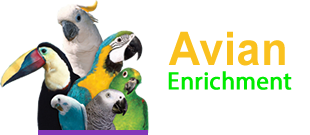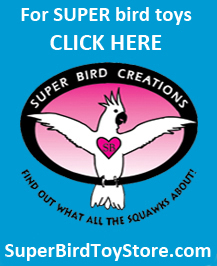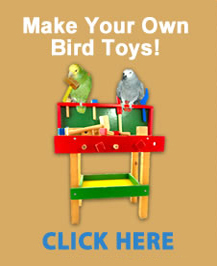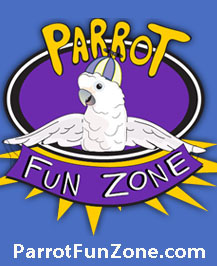The Importance of Social Interaction
 Parrots are flock animals with an innate need for companionship and social interaction. A parrot derives it's greatest sense of physical and emotional security from living within a flock. Parrots are rarely alone in the wild. The social nature of a flock is very important to a bird's emotional well-being. Flocks participate in many activities together such as eating, traveling, preening, bathing, climbing, playing, roosting, vocalizing and socializing.
Parrots are flock animals with an innate need for companionship and social interaction. A parrot derives it's greatest sense of physical and emotional security from living within a flock. Parrots are rarely alone in the wild. The social nature of a flock is very important to a bird's emotional well-being. Flocks participate in many activities together such as eating, traveling, preening, bathing, climbing, playing, roosting, vocalizing and socializing.
One of the most difficult of all things for a crow, a raven, a wolf or a human is to feel alone and separated from one's own kind. A sense of belonging is one of the most universal of all feelings. - Lawrence Kilham, 1989
A bird left in isolation without love and attention will have a poorly developed sense of security or belonging. Parrots are social beings and isolation can lead to the development of negative behaviors, depression and even insanity.
Within our homes it is important that we provide for our birds need for social connectedness. Fortunately, our birds exceptional intelligence in combination with their innate social nature enables them to relate to their human family as their flock.
You can help your bird feel as though he is part of your flock by:
- Respecting and interacting with him as a full fledged, equal member of your family.
- Including your bird in routine day to day activities. Even folding laundry can be great fun to a bird.
- Sharing meal time. Eating is a flock behavior and your bird will relish opportunities to share healthy meals with the family.
- Establishing fun rituals to enjoy with your bird every day (interactive games, songs, greetings, goodbyes).
- Acknowledging and responding to your bird's contact calls to reassure him when you are in other parts of the house.
To set the stage for successful social interactions between your parrot and its human flock it is imperative to know how to socialize your bird as well as how to give your bird attention and guidance.







Comments powered by CComment